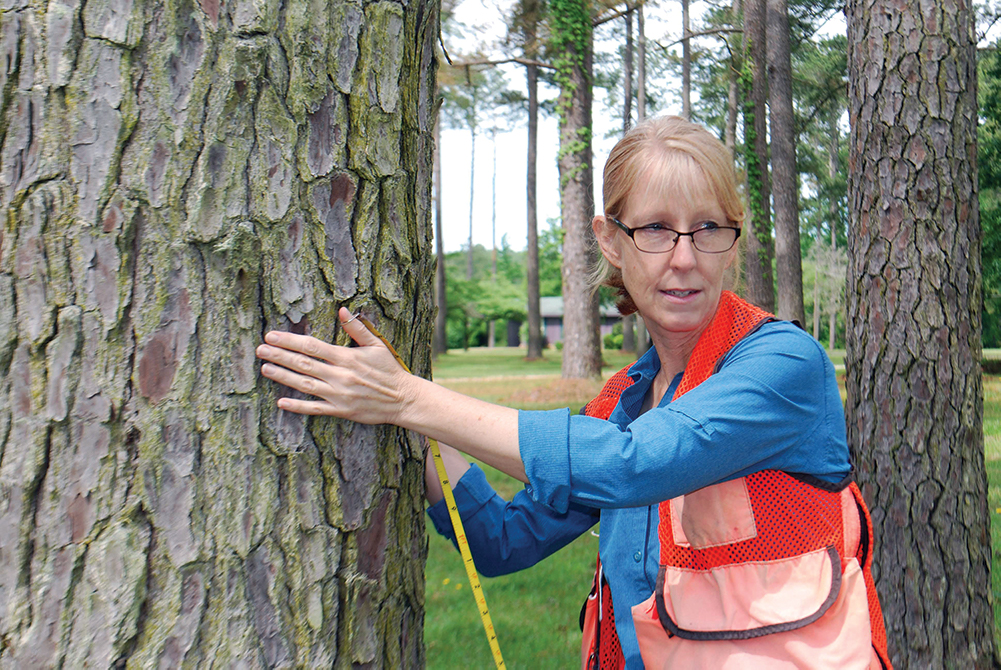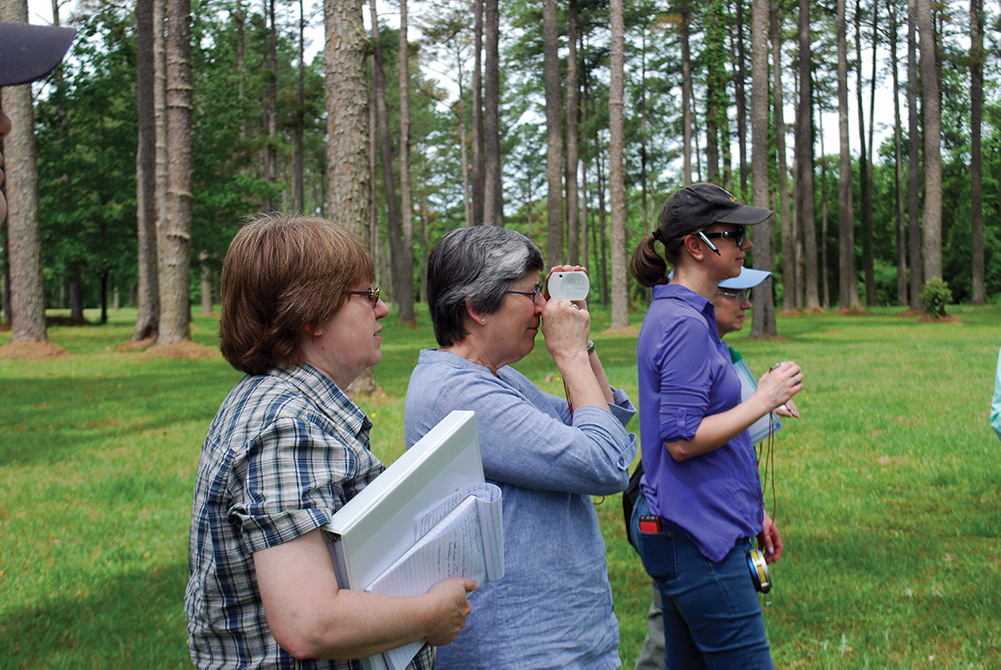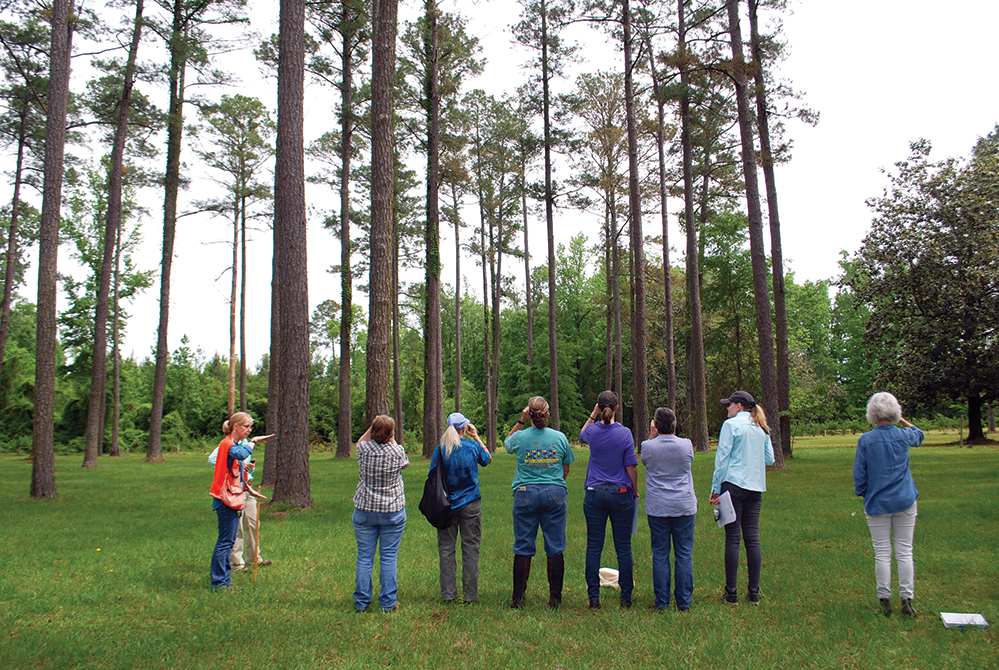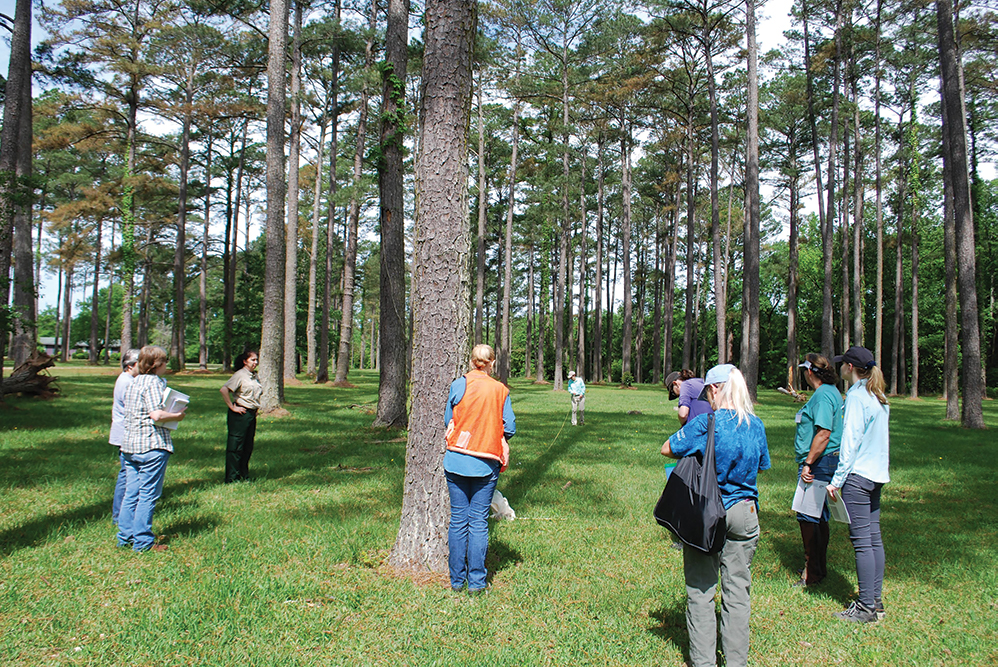Helping women grow family trees and legacies
Story and photos by Katie Jackson

Family forestlands don’t just grow trees, they grow family legacies — inheritances that, if managed well, can be sustained for generations to come.
What happens to those legacies, though, if family forestland is passed on, but forestland management know-how is not?
That’s been a puzzling question for generations of families, and it’s been particularly vexing for women who, all too often, inherit family land without the benefit of family land-management knowledge. Luckily, it’s one of many questions being answered by Alabama’s ForestHER program.
ForestHER is a woman-focused workshop series designed and led by Auburn University Forestry and Wildlife Sciences Professor Becky Barlow, an Alabama Cooperative Extension System forestry specialist who knows firsthand the challenges women forestland owners can face.
While there are many experienced female land managers in the state, it’s quite common for women with little, if any, experience to be thrust into managerial roles. That’s because family land management has traditionally been under the purview of the menfolk, often leaving the womenfolk less, if at all, engaged in the process.
Since women typically outlive men, that arrangement is — and always has been — problematic for the wives, daughters, sisters, mothers and female cousins who inherit responsibility for land, but not the knowledge or connections they need to carry on the land’s legacy. It can also be a problem for the growing number of women who are creating their own legacies by investing in forestland.

These two groups are among the growing number of land-owning women in the U.S., which doubled from 11 percent of all landowners in 2006 to 22 percent in 2013 and continues to rise. Whether these women come into land management roles by choice or by chance, however, they all need networking and educational opportunities. Finding those opportunities and resources can be a challenge, especially for women who aren’t familiar with the lay of the land or feel out of place in a primarily male-dominated industry.
This need has spurred the creation of numerous woman-focused forest and woodland landowner programs across the country. Here in Alabama, where two-thirds of the state’s 23 million acres of forestland is family-owned, Barlow and her Extension colleagues recognized a similar need and created ForestHER, the idea for which sprang from Barlow’s own experience in her home state of Mississippi.
“It started with my grandma,” Barlow says. Her grandmother, who owned long-held family land in Mississippi, was busy caring for her sick husband when a kind-seeming man befriended her. Before long, the gentleman offered to help Barlow’s grandmother make a little extra money by arranging the sale of timber from her family property.
Barlow, who was working on a forestry degree at the time, cautioned her grandmother against the sale, but to no avail. “My grandma said, ‘No, no, he’s a good boy and he’s going to do me right,’” she recalls.
He didn’t do Barlow’s grandmother “right.” Instead, he cut the timber indiscriminately, making a mess of the property and then making himself scarce. “We later found out he was a timber buyer who didn’t represent her; he represented the mill, but she didn’t know that,” Barlow says.
Providing hands-on training
According to Barlow, this is a common mistake made by forest landowners, both female and male, if they don’t know the true value of their land and trees or know how to negotiate timber sales. It’s one of many potential pitfalls that Barlow addresses in ForestHER workshops, the first of which was held near Birmingham in 2017.
“We had no clue if anyone would show up,” Barlow said of that initial two-day session. However, nearly 30 women — and one very brave man — did come from Alabama, Georgia, Tennessee, Mississippi and as far away as Michigan to learn more about the basics of forest management.
The workshop provided hands-on training in such vital forestry management skills as how to read a topo-map, use a compass, measure tree diameters and heights, estimate forest inventory and much more. It also included outside speakers ranging from consulting foresters to experts from USDA’s National Resources Conservation Service, the Alabama Forestry Commission and Alabama Department of Conservation and Natural Resources.
According to Barlow, these speakers represent a crucial component of forest management. “Landowners usually have multiple objectives for their land, ranging from harvesting timber and hunting to environmental and historical preservation and more, so they need a team of people with a broad range of expertise to answer their questions.”
Since that first workshop, Barlow has taken the forestry basics course to locations across the state. She has also expanded ForestHER programming to include shorter workshops focused on specific topics like tree thinning, controlled burning, wildlife and pond management, forest history and much more.

While there are many experienced female land managers in the state, it’s quite common for women with little, if any, experience to be thrust into managerial roles.
ForestHER workshops not only build knowledge, they also help women refine their vision as landowners. Take Donna Kinstley, for example. Kinstley and her husband, Anthony, own and manage a 130-acre piece of land in Blount County.
“As long as I can remember, we dreamed of having property outside the city,” Kinstley says. It took them a long time, and a lot of Sunday scouting drives, but they finally found and bought this property, located a little over an hour from their home in Hoover, in 2013.
With help from such organizations as the ADCNR and the Alabama Forest Owners Association, the Kinstleys began making basic improvements to the property, which they use for hunting, outdoor education and as a spiritual retreat for family and friends. According to Kinstley, however, the huge turning point for their property came from her ForestHER workshop experience.
“I had two big takeaways from that ForestHER workshop,” Kinstley says. “The first was, it inspired us to work with the Alabama Forestry Commission to create a working wildlife habitat management plan.” That plan has helped the Kinstleys gain Alabama TREASURE and Stewardship Forest certifications and also helped them refine and, in some cases refocus, their land management strategies.
“The other thing is more intangible: to make the best of what we do have,” she continues. “We don’t have a lot of knowledge, money or even perfectly compliant land, but we can, and have, made improvements that are significantly impacting the wildlife as well as people who enjoy this property.”
According to Barlow, those kinds of takeaways, which are unique to each participant, are at the core of ForestHER. Its goal is to help participants envision the future of their land and give them the confidence to pursue that vision. Ultimately, that may mean Alabama’s female — and male — family forestland owners can grow not just trees, but family legacies.

To learn more about ForestHER and upcoming workshops, go to aces.edu/blog/topics/forestry/foresther-workshops/, contact your local Cooperative Extension office or email Barlow at [email protected].




